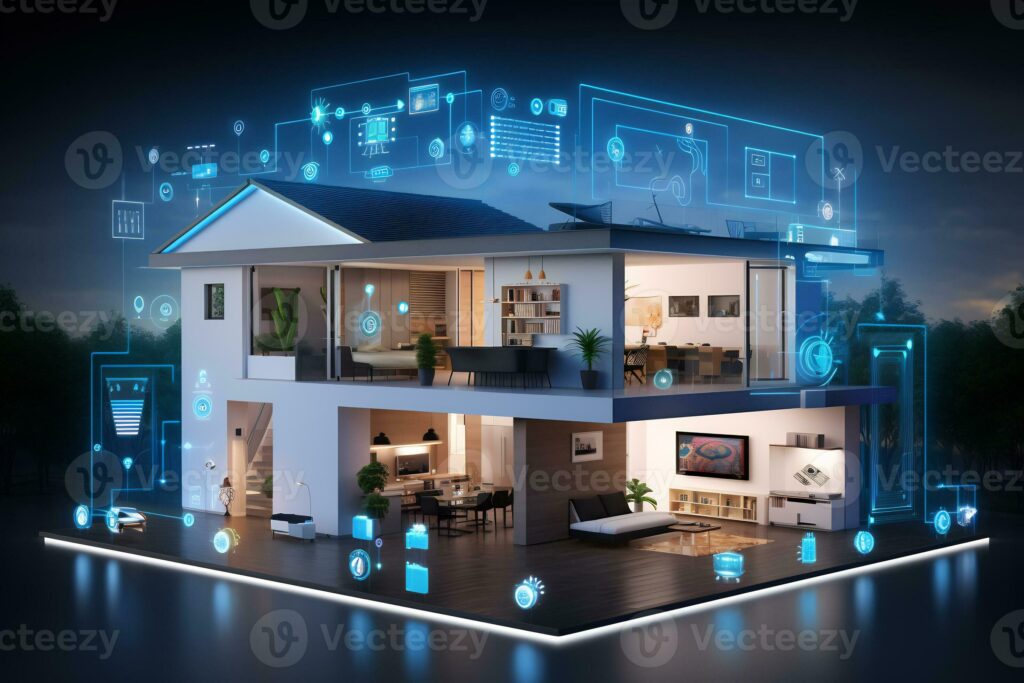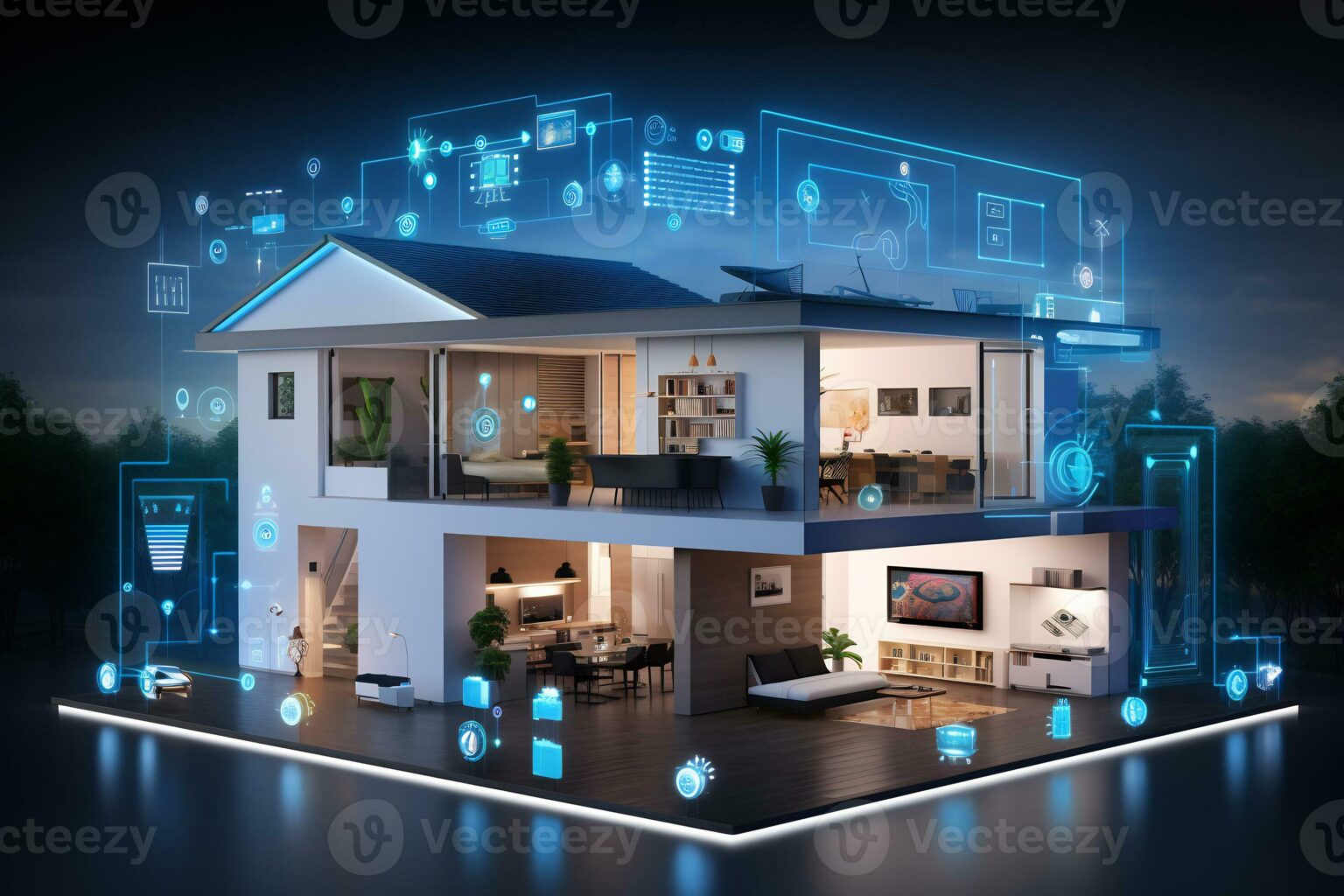
As we step into the future, the concept of the “smart home” has become increasingly prevalent, revolutionizing the way we interact with and experience our living spaces. At the heart of this transformation lies the integration of Artificial Intelligence (AI) – a powerful technology that is reshaping the very fabric of our homes.
In this article, we will embark on a captivating journey to explore the role of AI in transforming the modern house, delving into the evolution of smart homes, the various AI-powered features, the benefits and challenges, and the exciting prospects that lie ahead.
The Evolution of Smart Homes
The concept of the smart home has been steadily gaining traction over the past few decades. From the early days of basic home automation systems to the sophisticated, interconnected networks we see today, the evolution of smart homes has been a remarkable journey.
In the past, smart home technology was often seen as a luxury, accessible only to the technologically savvy or the affluent. However, as the industry has matured and the costs have become more affordable, the adoption of smart home technology has become increasingly widespread.
Today, smart homes are no longer just a futuristic concept; they are a reality that is transforming the way we live, work, and interact with our living spaces. With the integration of AI, the possibilities for smart home technology have expanded exponentially, opening up new avenues for enhanced comfort, convenience, and efficiency.
How AI is Transforming the Modern House
At the heart of the smart home revolution is the integration of AI, a technology that is redefining the way we interact with and control our living spaces. AI-powered systems are capable of understanding our preferences, anticipating our needs, and seamlessly adapting to our lifestyles, creating a truly personalized and intelligent living experience.
One of the key ways AI is transforming the modern house is through the development of advanced home automation systems. These systems are capable of controlling a wide range of home appliances and devices, from lighting and temperature to security and entertainment systems. By leveraging AI-powered algorithms, these systems can learn from our habits and behaviors, optimizing energy usage, enhancing security, and providing a more intuitive and responsive home environment.
Moreover, AI-powered virtual assistants, such as Alexa, Siri, and Google Assistant, have become integral components of smart homes, allowing us to control various aspects of our homes with simple voice commands. These assistants can perform a wide range of tasks, from setting reminders and playing music to controlling smart home devices and providing personalized recommendations.
AI-Powered Features in Smart Homes
As AI continues to evolve, the range of features and capabilities available in smart homes is expanding rapidly. Here are some of the key AI-powered features that are transforming the modern house:
Intelligent Lighting Control: AI-powered lighting systems can automatically adjust the brightness and color temperature of lights based on the time of day, our presence, and our preferences, creating a more comfortable and energy-efficient living environment.
Adaptive Heating and Cooling: AI-powered HVAC systems can learn our temperature preferences and adjust the climate in our homes accordingly, optimizing energy usage and ensuring optimal comfort.
Automated Security and Surveillance: AI-powered security systems can detect and respond to potential threats, such as intruders or suspicious activity, by triggering alerts, activating cameras, and even contacting emergency services.
Personalized Entertainment: AI-powered entertainment systems can analyze our viewing and listening habits, providing personalized recommendations for movies, TV shows, and music, enhancing our entertainment experience.
Proactive Maintenance and Diagnostics: AI-powered home appliances and systems can monitor their own performance, detect potential issues, and even schedule maintenance or repairs proactively, reducing the need for manual intervention.
Voice-Controlled Home Management: AI-powered virtual assistants can respond to our voice commands, allowing us to control various aspects of our homes, from setting reminders to managing smart home devices, with ease and convenience.
Predictive Automation: By analyzing our daily routines and patterns, AI-powered systems can anticipate our needs and preferences, automating various tasks and creating a more seamless and efficient living experience.
Benefits of AI in Smart Homes
The integration of AI in smart homes offers a multitude of benefits, transforming the way we live and interact with our living spaces. Here are some of the key advantages of AI in smart homes:
Enhanced Comfort and Convenience: AI-powered systems can adapt to our preferences and behaviors, creating a more personalized and comfortable living environment.
Improved Energy Efficiency: AI-powered home automation systems can optimize energy usage, reducing our carbon footprint and lowering our utility bills.
Increased Security and Safety: AI-powered security systems can enhance the overall safety of our homes by detecting and responding to potential threats.
Personalized Experiences: AI-powered systems can provide personalized recommendations and experiences, tailored to our individual needs and preferences.
Proactive Maintenance: AI-powered diagnostics can help identify and address potential issues before they become major problems, reducing the need for costly repairs and improving the overall reliability of our home systems.
Time-Saving Automation: By automating various tasks and routines, AI-powered smart homes can free up our time, allowing us to focus on more important aspects of our lives.
Enhanced Accessibility: AI-powered voice control and automation features can make smart homes more accessible for individuals with disabilities or mobility challenges.
Challenges and Concerns of AI in Smart Homes
While the integration of AI in smart homes offers numerous benefits, it also raises some challenges and concerns that must be addressed. These include:
Privacy and Data Security: The collection and storage of personal data by smart home devices raise concerns about privacy and the potential for data breaches or misuse.
Ethical Considerations: As AI systems become more advanced, there are ethical questions surrounding the decision-making processes and the potential for unintended consequences.
Interoperability and Compatibility: The diversity of smart home devices and platforms can lead to compatibility issues, making it challenging to create a seamless and integrated smart home experience.
Dependency on Technology: As we become increasingly reliant on smart home technology, there is a risk of over-dependence and the potential for disruptions or malfunctions that could impact our daily lives.
Cybersecurity Vulnerabilities: Smart home devices can be vulnerable to cyber attacks, potentially compromising the security of our homes and the personal information stored within.
Affordability and Accessibility: While the cost of smart home technology has become more affordable, it may still be out of reach for some individuals, creating a digital divide.
Technological Literacy: Effective utilization of smart home technology requires a certain level of technological literacy, which may pose a challenge for some users.
The Future of Smart Homes and AI
As we look towards the future, the integration of AI in smart homes is poised to continue its rapid evolution, transforming the way we live and interact with our living spaces. Here are some of the exciting prospects that lie ahead:
Increased Artificial General Intelligence (AGI): As AI systems become more advanced, we may see the emergence of Artificial General Intelligence (AGI), which could revolutionize the capabilities of smart home technology, enabling even more personalized and adaptive experiences.
Seamless Integration of IoT Devices: The continued growth of the Internet of Things (IoT) will lead to a more interconnected and cohesive smart home ecosystem, where various devices and systems can communicate and work together seamlessly.
Advancements in Natural Language Processing: Improvements in natural language processing (NLP) will enhance the conversational abilities of virtual assistants, making voice control and interaction even more intuitive and user-friendly.
Predictive and Adaptive Automation: AI-powered systems will become increasingly adept at anticipating our needs and preferences, automating a wider range of tasks and creating a truly seamless and responsive living environment.
Improved Energy Efficiency and Sustainability: As the focus on environmental sustainability grows, AI-powered smart home systems will play a crucial role in optimizing energy usage, reducing our carbon footprint, and promoting more eco-friendly living.
Enhanced Home Healthcare and Aging-in-Place: AI-powered smart home technologies will play a significant role in supporting aging populations and individuals with special needs, enabling them to live independently and safely in their homes for longer.
Increased Personalization and Customization: As AI systems learn more about our unique preferences and behaviors, the level of personalization and customization in smart homes will continue to evolve, creating a truly bespoke living experience.
Examples of AI-Powered Devices for Smart Homes
To illustrate the transformative power of AI in smart homes, let’s explore some examples of AI-powered devices that are already available or in development:
Smart Thermostats: AI-powered thermostats, such as Nest and Ecobee, can learn our temperature preferences and adjust the climate in our homes accordingly, optimizing energy usage and ensuring optimal comfort.
Smart Lighting Systems: AI-powered lighting systems, like Philips Hue and LIFX, can automatically adjust the brightness and color temperature of lights based on the time of day, our presence, and our preferences, creating a more comfortable and energy-efficient living environment.
Smart Security Systems: AI-powered security systems, such as Ring and Nest Cam, can detect and respond to potential threats, triggering alerts, activating cameras, and even contacting emergency services.
Smart Home Assistants: AI-powered virtual assistants, like Amazon Alexa, Google Assistant, and Apple’s Siri, can respond to voice commands, control smart home devices, and provide personalized recommendations and information.
Smart Appliances: AI-powered home appliances, such as smart refrigerators, washing machines, and ovens, can monitor their own performance, detect potential issues, and even schedule maintenance or repairs proactively.
Smart Home Hubs: AI-powered home hubs, like the Amazon Echo, Google Home, and Apple HomePod, can serve as the central control and integration point for various smart home devices, allowing users to manage their homes through a single interface.
Smart Robotic Vacuums: AI-powered robotic vacuums, such as the Roomba and Ecovacs Deebot, can navigate and clean our homes autonomously, adapting to different floor plans and furniture layouts.
Integrating AI into Your Home: Tips and Considerations
If you’re interested in incorporating AI-powered technology into your home, here are some tips and considerations to keep in mind:
Assess Your Needs: Carefully evaluate your lifestyle, preferences, and the specific areas of your home that could benefit from smart home technology.
Research and Compare Products: Explore the various AI-powered devices and platforms available, comparing features, compatibility, and user reviews to find the best fit for your home.
Start Small and Gradually Expand: Begin with a few key smart home devices, such as a smart thermostat or lighting system, and gradually integrate more AI-powered technologies as you become more comfortable with the technology.
Ensure Compatibility and Interoperability: Prioritize devices and platforms that offer seamless integration and compatibility, ensuring a cohesive and responsive smart home experience.
Prioritize Privacy and Security: Look for smart home devices with robust security features and consider the privacy implications of the data collected by these devices.
Stay Informed and Embrace Continuous Learning: As the smart home industry continues to evolve, stay up-to-date with the latest advancements and be prepared to adapt and learn new skills to make the most of your AI-powered home.
Are you ready to embrace the future of smart homes and AI? Contact our team of experts today to learn more about how you can integrate AI-powered technology into your living space and unlock the full potential of your modern house. Together, let’s create a truly intelligent and personalized home experience.

